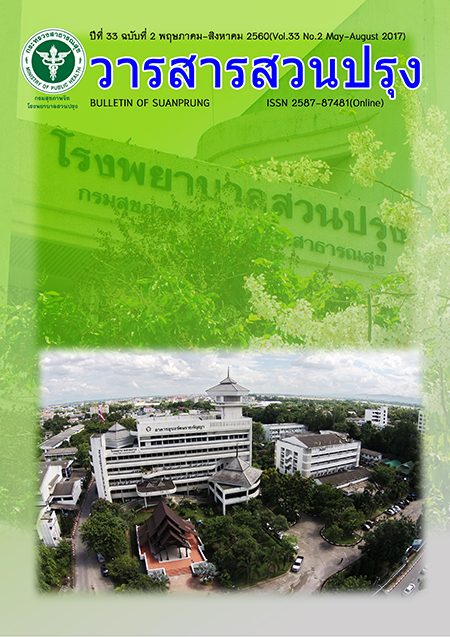Effectiveness of Implementing the Anger Management Program Among Patients with Schizophrenia Addicted to Tobacco, Suan Prung Psychiatric Hospital, Chiang Mai Province;ประสิทธิผลของโปรแกรมการจัดการความโกรธในผู้ป่วยจิตเภทที่ติดบุหรี่ รพ.สวนปรุง จ.เชียงใหม่
Main Article Content
บทคัดย่อ
Abstract
Objective: to evaluate the effectiveness of implementing the anger management program among patients with schizophrenia addicted to tobacco.
Method:This was an operational study. The sample group was composed of six nurses and thirty patients with schizophrenia who were addicted to nicotine and were reported to have shown aggressive behavior at SuanPrung Psychiatric Hospital, Chiang Mai Province, during October to December 2015. The instruments used in this study consisted of: 1) The personal information record form; 2) The Thai version of Positive and Negative Syndrome Scale; 3) Fager strom test for nicotine dependence; 4) Overt Aggression scale;5) The anger management program and 6) The questionnaires of nurses’ opinions toward the anger management program among patients with schizophrenia addicted to tobacco. Descriptive statistics were computed for data analysis.
Result: revealed that:
1. One week after implementing the anger management program, all patients with schizophrenia addicted to tobacco did not show aggressive behavior and the most useful methods to manage their anger were breathing exercises and non-vocal counting.
2. All nurses who used the program agreed on all items related to implementing the anger management program. These include relation advantage, compatibility, complexity, trial ability and observability.
Conclusion: The anger management program used for patients may decrease aggressive behavior in patients with schizophrenia addicted to tobacco.
Key words
Schizophrenia, Effectiveness, Anger management, Tobacco addiction
บทคัดย่อ
วัตถุประสงค์ ศึกษาประสิทธิผลของโปรแกรมการจัดการความโกรธในผู้ป่วยโรคจิตเภทที่ติดบุหรี่
วิธีการ เป็นการศึกษาเชิงปฏิบัติการกลุ่มตัวอย่าง คือ พยาบาลวิชาชีพจำนวน 6 ราย และ ผู้ป่วยโรคจิตเภท 30 ราย ที่ติดบุหรี่ และมีพฤติกรรมก้าวร้าว ที่รับการรักษาในโรงพยาบาลสวนปรุง จังหวัดเชียงใหม่ระหว่างเดือนตุลาคม ถึงเดือนธันวาคม พ.ศ. 2558 เครื่องมือที่ใช้ในการศึกษาประกอบด้วย 1) แบบบันทึกข้อมูลส่วนบุคคล 2) แบบประเมินอาการทางจิตผู้ป่วยโรคจิตเภทฉบับภาษาไทย 3) แบบวัดระดับการติดนิโคติน 4) แบบสังเกตพฤติกรรมก้าวร้าว 5) โปรแกรมการจัดการความโกรธ และ 6) แบบประเมินความคิดเห็นของบุคลากรทางการพยาบาลต่อการใช้โปรแกรมการจัดการความโกรธในผู้ป่วยจิตเภทที่ติดบุหรี่ วิเคราะห์ข้อมูลด้วยสถิติพรรณนา
ผลการศึกษา พบว่า
1. ตลอด1 สัปดาห์หลังได้รับโปรแกรมการจัดการความโกรธ ผู้ป่วยทั้งหมด ไม่แสดงพฤติกรรมก้าวร้าวเลยและวิธีการจัดการกับความโกรธที่ใช้มากที่สุด คือการหายใจเข้าออกและการนับในใจ
2. พยาบาลทั้งหมดเห็นว่าโปรแกรมการจัดการความโกรธมีประโยชน์ เข้ากันได้ดีกับสิ่งที่มีอยู่ ไม่มีความซับซ้อน นำไปทดลองปฏิบัติได้ และสังเกตเห็นผลได้
สรุป โปรแกรมการจัดการความโกรธในผู้ป่วย อาจลดพฤติกรรมก้าวร้าวในผู้ป่วยโรคจิตเภทที่ติดบุหรี่ได้
คำสำคัญ
โรคจิตเภท, ประสิทธิผล, การจัดการความโกรธ, ติดบุหรี่
Article Details
บทความหลังผ่านการปรับแก้จากกองบรรณาธิการแล้ว เป็นลิขสิทธ์ของวารสารจิตเวชวิทยาสาร โรงพยาบาลสวนปรุง กรมสุขภาพจิต กระทรวงสาธารณสุข ห้ามเผยแพร่เพื่อประโยชน์ทางการค้าโดยไม่ได้รับอนุญาต แต่อนุญาตให้เผยแพร่บทความดังกล่าวเพื่อประโยชน์ทางการศึกษาแก่ประชาชนทั่วไป ทั้งนี้กองบรรณาธิการไม่จำเป็นต้องเห็นด้วยกับบทความหรือข้อคิดเห็นใดๆ ที่ปรากฏในวารสารสวนปรุง

